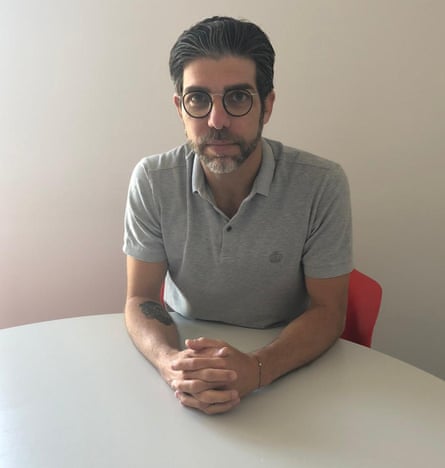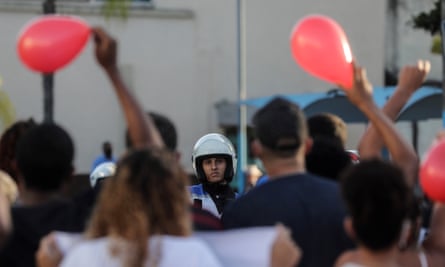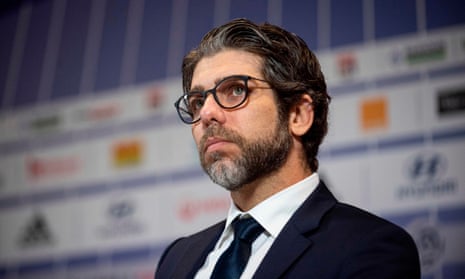Like so many other footballers and former professionals, Juninho Pernambucano could easily stay silent and not discuss the more important issues in life. But that, according to the former Lyon player and Brazil international, would be a betrayal of his principles.
We have been talking for 30 minutes when he breaks down in tears for the first time during an interview that lasts for two and a half hours. The situation in his native Brazil is out of control, the president, Jair Bolsonaro, having failed miserably to tackle coronavirus. This week the country went past 65,000 deaths and had almost 50,000 new cases in a day. The total number of cases has gone past 1.6 million. It is the second worst-hit country in the world.
Brazil is also a country of increasing inequality and racial tension under Bolsonaro’s leadership, and Juninho is discussing education and dignity when his voice starts to crack. “We have a poor education system in Brazil,” he says. “The rich people say we have to invest in education – but how? We need to fight against hunger, which is what [the former president] Lula said. If you are hungry you don’t have any confidence. Imagine a father or mother who are not able to provide three meals a day for your children. But even more important than education is dignity. Human dignity is a right that all of us need to have. Sorry, this is making me all very emotional …”
Dignity has been in short supply for the majority of Brazilians recently and the government’s handling of the coronavirus crisis has only made matters worse. “I feel a deep sadness,” Juninho says, his voice breaking again. “Despair. We are doing everything wrong; going against everything that the rest of the world is doing. I am Brazilian, I know we are a poor country and our people need to work, but this is a question of life. If we had had a lockdown we could be close to the end of this but no … it is desperate to see our country now.”

Juninho, a former Sport Club do Recife and Vasco da Gama midfielder who now lives in France and is working for Lyon as sporting director, felt in 2018 he could no longer stay in Brazil. He moved to Los Angeles to be with his daughter, who was pregnant, and a year later back to France. He says he is no longer in contact with “80 or 90%” of his family and friends because of disagreements over Bolsonaro and his politics.
“In the beginning, around the second round of the 2018 presidential election, I tried to talk to people and show them videos and everything about what was going on,” he says. “Bolsonaro is a son of WhatsApp and fake news. The people supporting Bolsonaro were in the majority and it was my decision to walk away from them. I know some of them are regretting their decision now. They thought Bolsonaro was the only option.
“The establishment in Brazil does not have empathy and is teaching us not to have it too. The elite does not understand how big the financial inequalities are in the country and if they get bigger there will be violence. We are watching it unravel now. We have great journalists in our country but not a publisher who will go ahead and publish. More than 42 million people didn’t vote in 2018. If the Brazilian press had done its real work, Bolsonaro would never have been elected. Just real journalism: write and tell everyone the truth.”
The prevalence of fake news in Brazil under Bolsonaro and during the last two election campaigns are topics Juninho keeps returning to. Since 2014, Brazil has faced a political crisis and, according to Juninho, the impeachment of the Workers’ Party candidate Dilma Rousseff in 2016 and Bolsonaro’s election win in 2018 are the major factors behind the unrest. “When you take out Dilma in such a despicable way, you break a young democracy. Bolsonaro [winning] is a result of a boastful judge such as [Sérgio] Moro in the Lula case, a hate culture against the Workers’ Party and fake news,” he says.
There is some movement now, with Brazil’s top court starting an investigation into the fake news that has been flooding social media, and a few weeks ago police raided addresses linked to Bolsonaro. Juninho tries to help this fight, but without much success. “Twitter, Facebook and WhatsApp decided Brazil’s election,” he says. “I am tired of reporting fake news on Twitter. I am always sending messages. They are guilty for our problems and there hasn’t been any action against them.
“Look how many far-right channels there are on YouTube. They get a huge amount of money to spread fake news but they are [still] authorised by YouTube. I report this almost every day [to the social media companies], but I rarely receive an answer.”
Our conversation turns to the killing of George Floyd in Minneapolis on 25 May and the Black Lives Matter movement. More than half of the Brazilian population identifies as black and the country has had several cases similar to that of Floyd, including João Pedro, a 14-year-old boy killed by Brazilian police in June, or Ágatha Félix, who was only eight years old when she was shot in the back by police in a Rio favela in September 2019. She later died.

“This is a clear racism, a confirmation of the kind of violent politics we have in the country at the moment,” says Juninho. “How was it possible for an eight-year-old child to be shot by police like happened last in year in the Complexo do Alemão? How is it possible to live after that? Unbelievable. Look at George Floyd. He couldn’t breathe. He is a human being. I can’t imagine how the police can do that. It’s racism and very, very sad.”
Juninho bristles at the recent comments from Eduardo Bolsonaro, Jair’s son, who is a congressman and also a representative for Steve Bannon’s The Movement in South America. Eduardo Bolsonaro recently said that there were no George Floyds in Brazil.
“There are thousands of George Floyds in Brazil and thousands of others who have suffered in silence that we don’t know about,” Juninho says. “It’s inhumane to say that we don’t have George Floyds in Brazil. The shootings happen every day. Gay people are persecuted too and that is one of the things I am most angry about with the people who support Bolsonaro. However, no one can beat time. Someday everyone will discover who you really are.”
The former midfielder, best known for his incredible free-kicks during a 20-year career that saw him win 40 caps, says he learned a lot by moving to Europe. “In Brazil we are taught to care only about money but in Europe they have a different mentality. Unconsciously I made a career plan because I wanted to go to another big club in Brazil, and not to just play for sport. I was taught to go to who would pay me the most. That is the Brazilian way.
“Look at Neymar. He moved to PSG just because of money. PSG gave everything to him, everything he wanted, and now he wants to leave before the end of his contract. But now is the time to give back, to show gratitude. It’s an exchange, you see. Neymar needs to give everything he can on the pitch, to show total dedication, responsibility and leadership. The problem is that the establishment in Brazil has a culture of greed and always want more money. This is what we were taught and what we learned.”
So is Neymar at fault here, or the Brazilian society? “It is simply what he learned. I need to differentiate between Neymar as a player and Neymar as a person. As a player, he is in the top three in the world, at the same level as Cristiano Ronaldo and Leo Messi. He is fast, tough, can score and make assists as a real No 10. But as a person, I think he is guilty because he needs to question himself and grow up. At the moment, however, he is just doing what life taught him to do.”

It is clear that Juninho is upset about the current situation at home but equally clear that he loves his country and desperately wants it to do well. At the end of a long and fascinating interview I have to ask Juninho whether he has any hope for the future. “Ah, yes, of course I need to believe,” he replies. “I grew up in Recife, lived in Rio, Lyon, Qatar and the United States. The place I love the most is Brazil.
“I know it is hard at the moment but I am a father, a grandfather and I want a better world. We have bad people, such as Bolsonaro’s family, but we have good people, too. We have wonderful doctors, teachers and artists. But we need to change as soon as possible. We have the resources to overcome this.”
